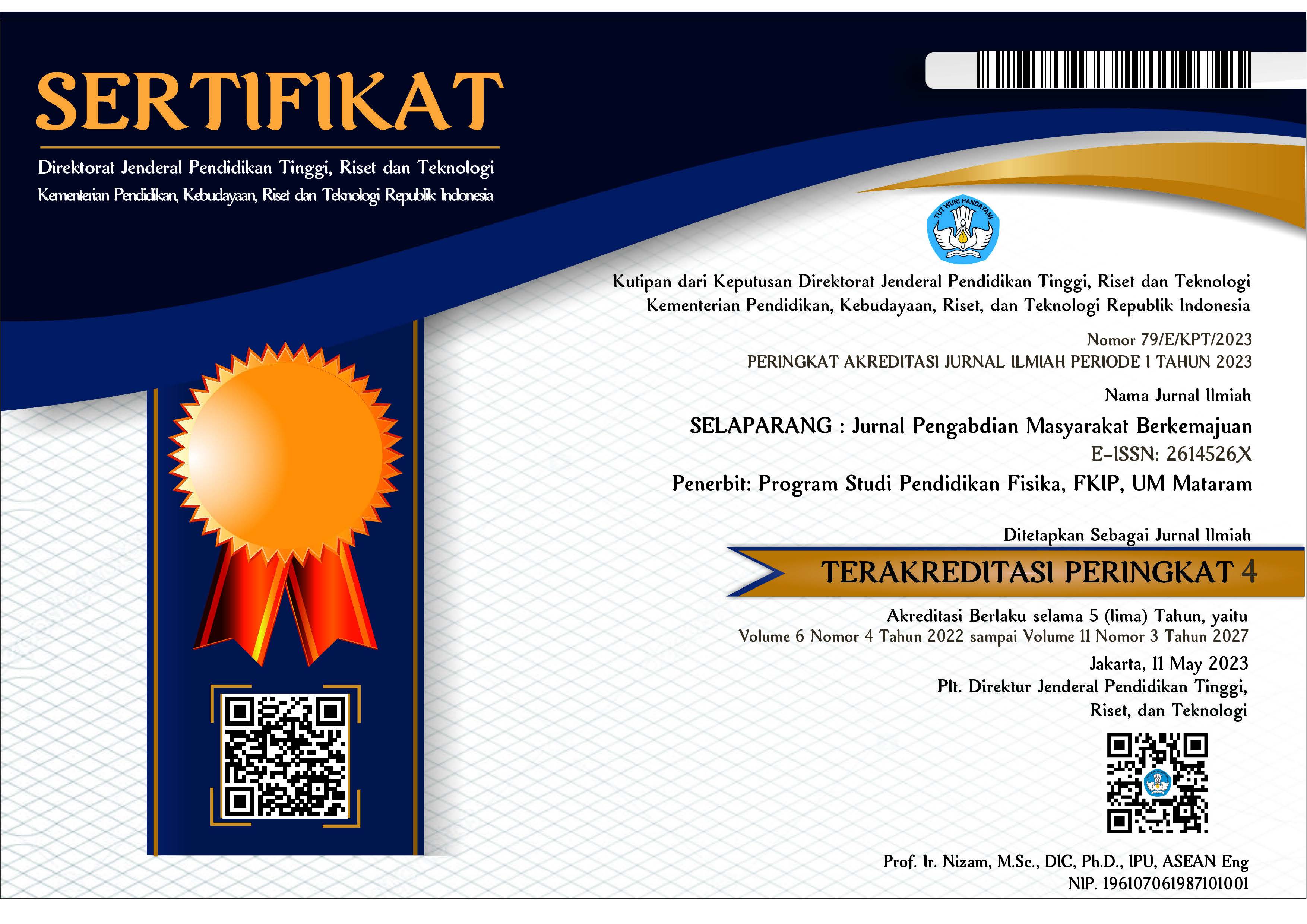Menerapkan computational thinking dengan python pada SMA Maitreyawira Kirasan
Abstract
Abstrak
Computational thinking adalah proses berpikir yang melibatkan penyelesaian masalah yang digambarkan ke dalam konsep dasar ilmu komputer. Kegiatan PKM ini bertujuan untuk meningkatkan kemampuan berpikir kritis dan logis serta meningkatkan kemampuan problem solving siswa dalam menyelesaikan contoh-contoh kasus selama proses pelatihan dengan cara Computational thinking. Dengan penerapan Computational Thinking, siswa dapat memahami konsep dasar kerja komputer dan menyelesaikan permasalahan berdasarkan data yang ada. SMA Swasta Maitreyawira Kisaran adalah sekolah menengah atas swasta yang berlokasi di Jalan Pramuka No.19 Kisaran, Kabupaten Asahan, Sumatera Utara. Kegiatan ini dilaksanakan dengan metode pelatihan terhadap 18 orang siswa dan 2 orang guru dalam menguasai keterampilan baru tentang berpikir secara komputasional serta pengetahuan baru tentang penerapan pemrograman dalam menyelesaikan permasalahan sederhana selama 2 hari pelatihan. Hasil pelatihan ini diukur menggunakan desain pretest-posttest yang dilakukan pada awal pelatihan dan juga diakhir pelatihan untuk melihat sejauh mana peningkatan kemampuan siswa dalam menyelesaikan masalah sederhana. Perbandingan antara hasil pra-test dan post-test menunjukkan adanya peningkatan pada pemahaman peserta didik terhadap cara berpikir komputasional (Computational Thinking) yakni dari yang sebelumnya hanya rata-rata 42% menjadi 76%. Adapun indikator yang perlu ditingkatkan seperti pehamaman terhadap konsep abstraksi dan penyelesaian masalah dalam bentuk koding python, hal ini terlihat selama proses pelatihan dimana sejumlah siswa terlihat masih bingung dalam membuat abstraksi dari masalah yang ada dan juga bagaimana menuangkannya kedalam kode program sehingga perlu dilakukan upaya lebih lanjut untuk mencapai pemahaman yang lebih komprehensif.
Kata kunci: pelatihan; pemikiran; komputasional; python.
Abstract
Computational thinking is a thought process that involves problem-solving described within the basic concepts of computer science. This PKM activity aims to enhance students' critical and logical thinking skills, as well as improve their problem-solving abilities in addressing case examples during the training process through computational thinking. By applying Computational Thinking, students can understand the fundamental concepts of how computers work and solve problems based on available data. SMA Swasta Maitreyawira Kisaran is a private high school located at Jalan Pramuka No.19 Kisaran, Asahan Regency, North Sumatra. This activity was conducted using a training method involving 18 students and 2 teachers to master new skills in computational thinking and acquire new knowledge on the application of programming in solving simple problems over a 2-day training period. The outcomes of this training were measured using a pretest-posttest design, conducted at the beginning and end of the training, to determine the extent of the improvement in students' abilities to solve simple problems. The comparison between the pre-test and post-test results showed an improvement in the participants' understanding of computational thinking, which increased from an average of only 42% to 76%. However, certain indicators still need improvement, such as understanding the concept of abstraction and solving problems in the form of Python coding. This was evident during the training process, where some students still appeared confused about creating abstractions of existing problems and how to translate them into program code. Therefore, further efforts are needed to achieve a more comprehensive understanding.
Keywords: training; thinking; computational; python.
Keywords
Full Text:
PDFReferences
Bai, H., Wang, X., & Zhao, L. (2021). Effects of the Problem-Oriented Learning Model on Middle School Students’ Computational Thinking Skills in a Python Course. Frontiers in Psychology, 12. https://doi.org/10.3389/fpsyg.2021.771221
Chagas, D., & Furtado, E. (2019). Computational Thinking in Basic Education in a Developing Country Perspective (pp. 135–150). https://doi.org/10.1007/978-3-030-30809-4_14
Grover, S., & Pea, R. (2013). Computational Thinking in K–12. Educational Researcher, 42(1), 38–43. https://doi.org/10.3102/0013189X12463051
Li, Y., Schoenfeld, A. H., diSessa, A. A., Graesser, A. C., Benson, L. C., English, L. D., & Duschl, R. A. (2020a). Computational Thinking Is More about Thinking than Computing. Journal for STEM Education Research, 3(1), 1–18. https://doi.org/10.1007/s41979-020-00030-2
Li, Y., Schoenfeld, A. H., diSessa, A. A., Graesser, A. C., Benson, L. C., English, L. D., & Duschl, R. A. (2020b). On Computational Thinking and STEM Education. Journal for STEM Education Research, 3(2), 147–166. https://doi.org/10.1007/s41979-020-00044-w
Proctor, C. (2023). Computational thinking. In International Encyclopedia of Education(Fourth Edition) (pp. 88–95). Elsevier. https://doi.org/10.1016/B978-0-12-818630-5.13078-7
Rao, T. S. S., & Bhagat, K. K. (2024). Computational thinking for the digital age: a systematic review of tools, pedagogical strategies, and assessment practices. Educational Technology Research and Development, 72(4), 1893–1924. https://doi.org/10.1007/s11423-024-10364-y
Saidin, N. D., Khalid, F., Martin, R., Kuppusamy, Y., & Munusamy, N. A. P. (2021). Benefits and challenges of applying computational thinking in education. International Journal of Information and Education Technology, 11(5). https://doi.org/10.18178/ijiet.2021.11.5.1519
Shin, N., Bowers, J., Krajcik, J., & Damelin, D. (2021). Promoting computational thinking through project-based learning. In Disciplinary and Interdisciplinary Science Education Research (Vol. 3, Issue 1). https://doi.org/10.1186/s43031-021-00033-y
Tekdal, M. (2021). Trends and development in research on computational thinking. Education and Information Technologies, 26(5), 6499–6529. https://doi.org/10.1007/s10639-021-10617-w
Widyawati, F. R., & Hafidz, H. (2023). Implementasi Computational Thinking pada pembelajaran PAI di SMA N 1 Gondang. At Turots: Jurnal Pendidikan Islam, 322–327. https://doi.org/10.51468/jpi.v5i001.242
DOI: https://doi.org/10.31764/jpmb.v9i2.29070
Refbacks
- There are currently no refbacks.

This work is licensed under a Creative Commons Attribution-ShareAlike 4.0 International License.
______________________________________________________
Jurnal Selaparang
p-ISSN 2614-5251 || e-ISSN 2614-526X
EDITORIAL OFFICE:



















